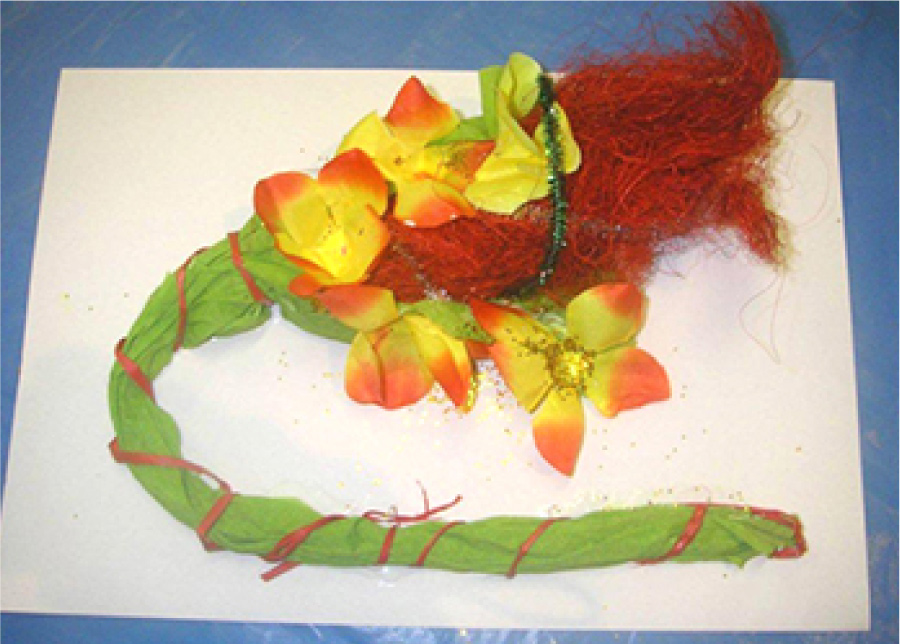Art Psychotherapy is a form of treatment that uses creative modalities, including art making, drama, and movement to improve and enhance physical, mental and emotional well-being. Art Psychotherapy is a form of psychotherapy which embraces a variety of theoretical frameworks. It differs from traditional art making or performance in that the emphasis is on the process of creating, rather than on the end product. A registered Art Psychotherapist has completed a two year masters level programme and focuses on developing a therapeutic relationship, with clear boundaries and goals. Art Psychotherapy can be practiced with individuals as well as groups.
A CLIENTS IMAGE & DESCRIPTION
This object was created by a lady in her 50’s who had suffered recurring episodes of severe depression and had commented that she felt her life had been of little value. We worked together over a period of twelve months and over time she was able to make images and objects that allowed her to describe her emotions in a way she could not do in words.
She described this object (made out of crepe paper, twine, flowers and straw) as a description of what it is like to suffer with depression. She said I feel all tied up, strangled by a rope that won’t let the beauty out. I know it is there, I just can’t access it . She described the frustration and anger at being stuck in an illness that made her feel defeated.
The psychotherapeutic work that was conducted over this period of time, helped this lady come to an understanding that she had not lost parts of herself and that she could access them if she felt safe and contained. Art Psychotherapy facilitated this growth for her.

ADVANTAGES IN ART THERAPY
Art Psychotherapy can help people to resolve conflicts, develop interpersonal skills, manage behaviour, reduce stress, increase self-esteem and achieve insight. It is a suitable form of treatment for all ages.
Other advantages include:
- Ability to express feelings difficult to discuss
- Stimulates imagination and creativity
- Develops healthy coping skills and focus
- Increases self esteem and confidence
- Clarifies issues and concerns
- Increases communication skills
- Ability to share in a safe nurturing environment
- Assists with development of motor skills and physical co-ordination
- Ability to identify feelings and blocks to emotional expression and personal growth
The combination of DBT and Art Psychotherapy can assist clients who suffer from any form of emotional dysregulation:
- Mood Disorders
- Personality Disorders
- Anxiety and Depression
- Addictions
- Eating Disorders
- Trauma
- Impulsive Behaviour
- Self-esteem issues
- Stressful Life Changes
Expressive Therapy Clinic offers other services listed below:
- Training in Dialectical Behaviour Therapy – Skills and Individual therapy
- Training and professional development for registered Arts Psychotherapists
- Training in using creativity alongside evidenced based therapies
- Supervision to Arts Psychotherapists
REGISTER FOR OUR NEXT ART THERAPY WEEKEND WORKSHOP
HISTORY OF ART THERAPY IN AUSTRALIA
- The 1940s saw the birth of art therapy as a profession in Europe, the UK & the USA.
- 1987 ANATA was established (Australian National Art Therapy Association).
- 2006 ANATA became ANZATA (Australia and New Zealand Art Therapy Association) – a conference is held every two years, a newsletter issued every quarter, and a peer-reviewed journal ANZJAT (Australian and New Zealand Journal of Art Therapy) published annually
- 2007 the NSW government wage award was granted to the profession.
- 2009 ANZATA membership opened to graduates of La Salle College in Singapore, creating a pan-Pacific network in our region
- ANZATA membership is now open to MEICAT Graduates
- Only Registered Arts Therapists are able to use the ANZATA trademark logo.


